1961
3 janvier 1961 : Fidelio. Scala de Milan. Karajan. Crass. Hotter. Vickers. Birgit Nilsson (Leonore). Frick. Lipp. Unger.
5 janvier 1961 : Fidelio. Scala de Milan. Karajan. Crass. Hotter. Vickers. Birgit Nilsson (Leonore). Frick. Lipp. Unger.
8 janvier 1961 : Die Walkure. Staatsoper de Vienne. Karajan. Vickers. Kreppel. Hotter. Zadek. Birgit Nilsson (Brunnhilde). Malaniuk.
10 janvier 1961 : Die Gotterdammerung. Staatsoper de Vienne. Karajan. Windgassen. Birgit Nilsson (Brunnhilde). Scheyrer. Roth-Ehrang. Hotter. Pernerstorfer. Ludwig.
12 janvier 1961 : Die Walkure. Opéra royal de Stockholm. Gielen. Svanholm. Tyren. Bjorling. Lund-Christiansen. Birgit Nilsson (Brunnhilde). Ericson.
15 janvier 1961 : Concert Cirkus, Stockholm. Nils Grevillius / Birgit Nilsson. Ci-dessous ; Pace, pace mio dio (La forza del destino) :
22 janvier 1961 : ROMANTICISM IN MUSIC. Film TV USA. Scénario de Léonard Bernstein. Narrateur et chef d’ orchestre : Leonard Bernstein. Avec Albert Da Costa, David Lloyd, Morley Meredith, Birgit Nilsson qui chante mild und leise (Tristan und Isolde) et O patria mia (Aida).
25 janvier 1961 : Tannhauser. Metropolitan Opera de New York. Strasfogel. Hopf. Birgit Nilsson (Elisabeth). Waechter. Harshaw. Wilderman. Nagy. Franke. Harvuot. Scott.
Review of Robert Sabin in the March 1961 issue of Musical America
This performance was memorable not only for the debut of Mr. Wächter but for the first Metropolitan Elisabeth of Miss Nilsson, who was appearing for the first time this season. Miss Harshaw was also heard for the first time in the role of Venus and Mr. Strasfogel conducted the opera for the first time at the Metropolitan, taking over from Georg Solti.
Having heard Mr. Wächter at Bayreuth as Amfortas in "Parsifal," as Kothner in "Die Meistersinger," and as the Heerrufer in "Lohengrin" (in all of which roles he was superb) I knew that he would be a distinguished Wolfram. And so he proved to be. His handsome appearance, his impeccable diction, his eloquent and finished singing made a profound impression. He is not one of the operatic Bulls of Bashan. His voice does not make the rafters tremble or the standees scream with excitement. But it is ample for all artistic needs and he uses it with the utmost intelligence and expressiveness. Would that we had more of his kind!
Miss Nilsson has never sung more beautifully. Happy is the opera house that can boast three such Elisabeths as Leonie Rysanek, Victoria de los Angeles and Birgit Nilsson! Not only in the grander phrases but in the subtler and more lyrical passages Miss Nilsson's voice had a roundness, a silvery glow and a marvelous smoothness reminiscent of the golden era of Flagstad. Dramatically, too, she revealed a thorough understanding of the character. Her mounting pain and horror in the scene in the Wartburg showed how carefully she had studied Wagner's text.
31 janvier 1961 : Tristan und Isolde. Metropolitan Opera de New York. Rosenstock. Vinay. Birgit Nilsson (Isolde). Cassel. Dalis. Hines. Uhde.
Review of Winthrop Sargeant in the New Yorker
On Tuesday night of last week, I attended the Metropolitan Opera's "Tristan and
Isolde" in an extremely critical frame of mind. Like nearly everybody else, I had greeted Birgit Nilsson's Isolde last year as a sunrise following the long period of darkness that enveloped Wagnerian sopranos with the retirement of Kirsten Flagstad. But I was aware that Miss Nilsson's voice is not quite the rich and incredibly voluminous one that Miss Flagstad hurled across the footlights with such wonderful ease. I was anxious to check again, and determine whether Miss Nilsson was really as good as I had thought she was. Before the first act was over, my doubts were set at rest. Miss Nilsson is not a Flagstad, but she is a Nilsson - something that is perhaps not as overwhelming but that is certainly remarkable enough. Her characterization of the role is exceedingly subtle and convincing; her high notes come through with ringing splendor; and her musical sense - evident in exquisite touches of phrasing and emphasis - is very nearly flawless. Last year I noted her fastidiousness in musical style, and referred to her as a very neat and well-schooled singer. But there is more than that to her Isolde. It is warm and touching, as well as brilliant where brilliance is called for. The sunrise is there, all right, and it is a resplendent one.
It is unfortunate that the Metropolitan has not yet found a Tristan to match Miss Nilsson's Isolde. Ramon Vinay, who undertook the role the other night, has, in his time, been a distinguished singer and a notable Tristan, and he still has the remains of a noble Wagnerian style. But the style is not of much service without the physical volume to project it, and in physical volume his voice has deteriorated to a tragic extent. He was unable to do more than outline his role, in tones that scarcely rose above a whisper. This difficulty posed a problem for the conductor, Joseph Rosenstock, who was called upon to adjust the orchestral sonority so that Mr. Vinay could occasionally be heard, or else to drown him out altogether in giving Miss Nilsson suitable support for her ample tones. Most of the time, Mr. Vinay was drowned out, but there was nothing else to he done, and on the whole Mr. Rosenstock brought an agreeable feeling of solidity and authority to his reading of the score. The lesser roles were very ably done. As Brangäne, Irene Dalis sang with beautiful control, reaching a peak of eloquence in those offstage phrases of the second act that help make up what to me is, aside from the "Liebestod," the most magical episode of the entire opera. Walter Cassel was again perhaps the most stylish and engaging Kurvenal I have ever encountered. It remains a mystery to me why this superb baritone - one of the Metropolitan's finest actors as well as a magnificent singer - is not more often used at the opera house, where he frequently stands aside in favor of second-rate artists. His Kurvenal has a special quality, to which masculinity, nerviness, and an extraordinarily handsome stage presence all contribute. Altogether, with the sole exception of Mr. Vinay's vocally weak interpretation of the hero's role, this was a memorable "Tristan," in which even the smaller parts - Jerome Hines' King Marke and Hermann Uhde's Melot among them - were performed with great distinction.
3 février 1961 : Tannhauser. Metropolitan Opera de New York. Strasfogel. Hopf. Birgit Nilsson (Elisabeth). Waechter. Dunn. Wilderman. Nagy. Franke. Harvuot. Scott.
6 février 1961 : Tristan und Isolde. Metropolitan Opera de New York. Rosenstock. Vinay. Birgit Nilsson (Isolde). Cassel. Dalis. Hines. Uhde.
11 février 1961 : Tannhauser. Metropolitan Opera de New York. Strasfogel. Hopf. Birgit Nilsson (Elisabeth). Waechter. Harshaw. Wilderman. Nagy. Franke. Harvuot. Scott.
16 février 1961 : Tristan und Isolde. Metropolitan Opera de New York. Rosenstock. Vinay. Birgit Nilsson (Isolde). Cassel. Dunn. Hines. Marsh.
24 février 1961 : Turandot. Metropolitan Opera de New York. Stokowski. Birgit Nilsson (Turandot). Corelli. Moffo. Giaiotti. De Paolis.
Review of Harold C. Schonberg in the N. Y. Times
Finally Puccini's "Turandot" came to the stage of the Metropolitan Opera. It had been absent since 1/8/1930, and one of the reasons for its absence was the lack of a soprano to sing the title role. Puccini wrote a ferociously demanding part, one that requires extraordinary strength of voice and stamina.
Birgit Nilsson sang it last night, and left no question about her mastery of the role. From her [first] phrases in the second act-she appears briefly in the first act and does not sing-the audience knew she was in prime voice.
As the act proceeded and Miss Nilsson swung into the great aria, "In questa reggia." she was triumphant. Her voice soared full and solidly, over orchestra, chorus and soloists, up to a tremendous high C that sounded as if there were still plenty in reserve.
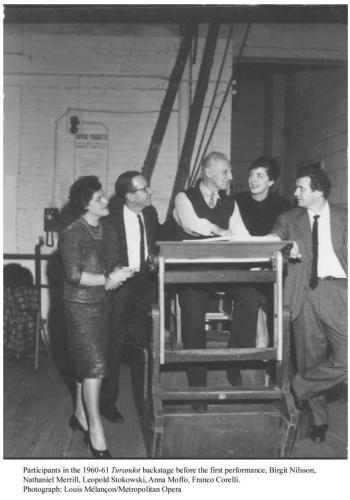
4 mars 1961 : Turandot. Metropolitan Opera de New York. Stokowski. Birgit Nilsson (Turandot). Corelli. Moffo. Giaiotti. De Paolis. ENREGISTREMENT LIVE.
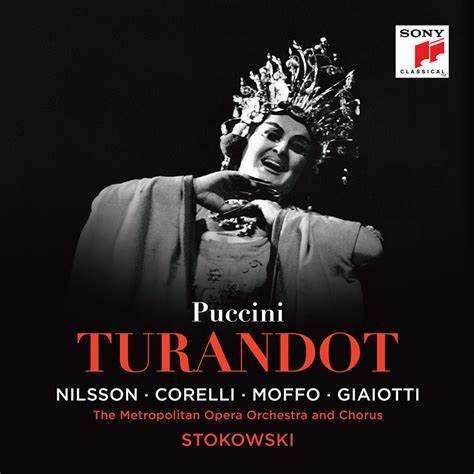
9 mars 1961 : Turandot. Metropolitan Opera de New York. Stokowski. Birgit Nilsson (Turandot). Corelli. Stratas. Giaiotti. De Paolis.
13 mars 1961 : Turandot. Metropolitan Opera de New York. Stokowski. Birgit Nilsson (Turandot). Corelli. Stratas. Giaiotti. De Paolis.
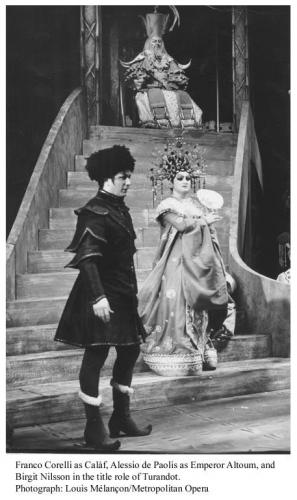
18 mars 1961 : Tristan und Isolde. Metropolitan Opera de New York. Rosenstock. Liebl. Birgit Nilsson (Isolde). Cassel. Dalis. Hines. Marsh. ENREGISTREMENT LIVE.
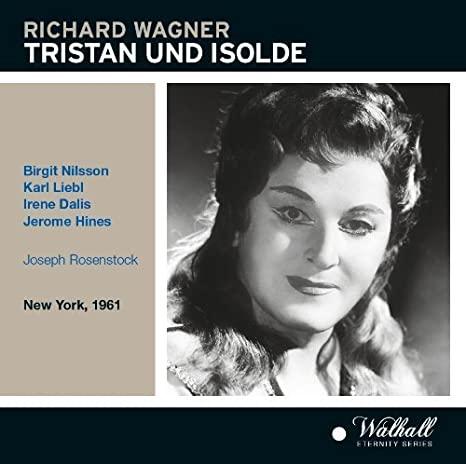
21 mars 1961 : Turandot. Philadelphie. Stokowski. Birgit Nilsson (Turandot). Corelli. Price. Wilderman. De Paolis.
24 mars 1961 : Turandot. Metropolitan Opera de New York. Stokowski. Birgit Nilsson (Turandot). Corelli. Amara. Wilderman. De Paolis.
29 mars 1961 : Turandot. Metropolitan Opera de New York. Stokowski. Birgit Nilsson (Turandot). Corelli (acte 1), Gari (actes 2 et 3). Price. Wilderman. De Paolis.
31 mars 1961 : THE BELL TELEPHONE HOUR (TV USA). Saison 3, épisode 12 - The signs of spring. Réalisateur : Sid Smith. Avec The Bell Telephone Orchestra, Mel Brandt, The Brothers Four, Schola cantorum, Paul Hartman, Melissa Hayden, Allegra Kent, Birgit Nilsson, Andres Segovia, Edward Villella, Patricia Wilde.
8 avril 1961 : Turandot. Metropolitan Opera de New York. Stokowski. Birgit Nilsson (Turandot). Corelli. Albanese. Giaiotti. De Paolis.
11 avril 1961 : Turandot. Metropolitan Opera de New York. Stokowski. Birgit Nilsson (Turandot). Corelli. Moffo. Giaiotti. De Paolis.
14 avril 1961 : Aida. Metropolitan Opera de New York. Verchi. Birgit Nilsson (Aida). Baum. Cvejic. Colzani. Scott. Flagello.
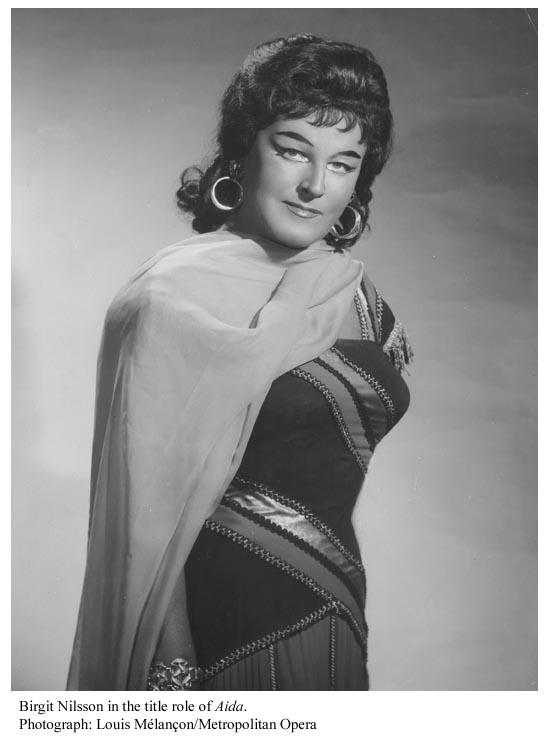
19 avril 1961 : Turandot. Boston. Stokowski. Birgit Nilsson (Turandot). Corelli. Amara. Giaiotti. De Paolis.
26 avril 1961 : Turandot. Cleveland. Adler. Birgit Nilsson (Turandot). Corelli. Amara. Giaiotti. De Paolis.
1 mai 1961 : Turandot. Atlanta. Adler. Birgit Nilsson (Turandot). Corelli. Amara. Giaiotti. De Paolis.
Review of Bruce Galphin in the Atlanta Constitution
Nilsson's Magical Soprano Casts Its Spell as Turandot
The 5,000 most satisfied people in America Monday must have been in the Fox Theater audience at the Metropolitan Opera's "Turandot" production here. The curtain-raiser had been anticipated on at least half a dozen counts in addition to the first-night glamour. It more than lived up to expectations. A generation has passed since "Turandot" last graced the boards, during which time it has sunk into the semi-oblivion of occasional recordings. In view of its musical splendor and dramatic excitement, its neglect is, at first, hard to understand.
But with the [beginning] of the second act, the explanation becomes apparent: "Turandot," besides executing many a wooing prince, also is a soprano-killer. It builds to one of the longest vocal crescendos in the literature, demanding prolonged periods above high C. In short, it takes a soprano of Birgit Nilsson's power and range to handle its near-Wagnerian proportions. The audience was well advised in its wild acclaim of Miss Nilsson. Without her, the long scene beginning with the awesome "In Questa Reggia" and concluding with the vanquishing of the "fire and ice" after the riddle solving, would have collapsed, and with it, the entire production. Instead, it was a real stunner, mounting constantly in intensity and splendor.
Franco Corelli, whose Atlanta debut was among the major attractions Monday night, showed why he has been receiving such loud huzzahs abroad. Corelli's good looks already have been well publicized. His stage presence is a lesser known quality. His tone is clear and exact and ranks him among the best of the best.
10 mai 1961 : Aida. Saint-Louis. Verchi. Birgit Nilsson (Aida). Corelli. Dalis. Merrill. Giaiotti. Flagello.
13 mai 1961 : Turandot. Chicago. Adler. Birgit Nilsson (Turandot). Corelli. Amara. Giaiotti. De Paolis.
Review of Claudia Cassidy in The Chicago Tribune
On the Aisle
Franco Corelli Joins Birgit Nilsson in a Stunning 'Turandot'
The third time's the charm and style, the open sesame. After two disasters in the maligned name of opera, the Metropolitan brought Franco Corelli to town with Birgit Nilsson in a stunning new " Turandot." Superbly staged by Yoshio Aoyama in Cecil Beaton's dreams of faraway legends that pass as scenery and costumes, it could almost make you forget that the plaster is not quite ready at McCormick Place to have air conditioning turned on full blast. Miss Nilsson patted her Turandot legend of a face once or twice, but it stayed beautifully put. Still, some of us remembered the summer night at Ravinia when Leon Rothier's Mephisto goatee skidded and stuck rakishly to his oblivious throat.
Between acts, that is. While the curtain was up, and it sometimes took a long time to rise on those complicated double scenes, "Turandot" held undivided attention. The fortunate have heard it sung to the hilt on other occasions, but seldom, if ever, as marvelously staged. Mr. Beaton had conjured ancient walls in mauve gray and fabulous towers at fascinating angles against which he set such costumes as Turandot's in vermilion and magenta and turquoise against tall Calaf's Tartar look with the black fur cap and the long black cape slashed with scarlet lining, plus hordes of servitors, counselors, executioners, wraiths and mimes, and high on his imperial throne, the tottering, gleeful old emperor in imperial yellow, gleaming like some withered, but indomitable, sun. And for every costume, the perfect make-up, the savage striking against the imperturbable like a gong.
If you remember the infinite subtlety of Mr. Aoyama's "Butterfly," you can expand it into massive brilliance of "Turandot." The man is a kind of magician in that he can lift an authoritative hand and the Metropolitan stage so drab with "Aida," so coarse with "Martha," turns mesmeric with "Turandot." On that stage and into that challenge came two stars of extraordinary brilliance. Miss Nilsson, who has a broadsword of a soprano, really unsheathed it for the big house. It is steel, but tempered steel, and the higher it mounts the more dangerous its sound, for at the highest altitude it releases a new and lambent beauty. No change there - just more so.
Mr. Corelli, the tall young Italian - 6 feet, 2 - from Ancona on the Adriatic, is a strikingly handsome man with a beautiful voice. It is a soaring voice with the edge of courage on it, yet an Italian voice with the caressing timbre and the turn of a phrase that displays the truest Puccini beauty. He has stage sense in every move, and he knows precisely how to give an audience the full delight of the duel of the man and the woman of ice, how to conjure in the dusk the poignancy of Puccini's last throbbing nocturne, "Nessun dorma."
17 mai 1961 : Turandot. Minneapolis. Adler. Birgit Nilsson (Turandot). Corelli. Amara. Giaiotti. De Paolis.
19 mai 1961 : Aida. Minneapolis. Verchi. Birgit Nilsson (Aida). Fernandi. Dunn. Colzani. Giaiotti. Flagello.
Review of John K. Shermann in the Minneapolis Star
Nilsson and Dunn Shine as 'Aida' Replacements
Two indisposed singers - Leonie Rysanek and Irene Dalis - made last night's performance of Verdi's "Aida" a surprise package for clients of the Metropolitan Opera season. Regrets over not hearing these two were balanced by the thrill of hearing their two replacements in some of the finest female singing heard in Northrop auditorium.
Surely an extra dividend for operagoers was the opportunity of again hearing Birgit Nilsson, who sang the title role and, more than that, of hearing her in a warm and human role after her portrayal of the cold and merciless Princess Turandot of two evenings before. As for Mignon Dunn, who took over the Amneris part for the first time on the Met's stage, her performance was a triumph, no less. Her vocalism and acting were both on a consistently high level, and perfectly merged. So we were twice lucky in a substitution situation which too often is a letdown.
In fact, the evening was virtually theirs. Nilsson revealed what "Turandot" does not allow her to show - great versatility as a singing actress with nuances and depth of characterization and singing that strikes a full range of emotional chords. As before, her voice and technique seem to know no obstacles, the tone rings out straight and clear at all levels, with the high and loud notes approached by the most artful phrasing to make them not a screech, but a natural, unforced climax. We heard more of her beautiful lower range: the pathos of the role was well delineated without undue emotionalism. She and Miss Dunn made their tempestuous duet the first high point of the opera, and the latter crowned her performance by the fire, anguish and despair of her Act IV aria, eloquently conveyed by singing of dramatic conviction and tonal opulence, joined with a histrionic skill to match.
22 mai 1961 : Turandot. Detroit. Adler. Birgit Nilsson (Turandot). Corelli. Amara. Giaiotti. De Paolis.
26 mai 1961 : Aida. Detroit. Verchi. Birgit Nilsson (Aida). Corelli. Dunn. Guarrera. Giaiotti. Flagello.
30 mai 1961 : Turandot. Toronto (Canada). Adler. Birgit Nilsson (Turandot). Corelli. Stratas. Giaiotti. De Paolis.
Review of John Kraglund in the Toronto Globe and Mail
Dazzling Birgit Nilsson Makes Grand Theatre of Turandot
If the name Turandot was not emblazoned in the Toronto sky over the O'Keefe Centre last night, it was because the cosmic forces had concentrated upon the spelling of Birgit Nilsson, who interpreted the title role in the Puccini opera. The second production in the Metropolitan Opera Company's Toronto season, sponsored by the Rotary Club, was the most convincing evidence this city has ever been offered that grand opera is also grand theatre. Before this review becomes hopelessly entangled in superlatives inadequate to describe the artistry of Miss Nilsson, it should be pointed out that the production as a whole warranted almost unqualified praise.
The reservations that exist were often prompted by comparative factors, but I, for one, would not have exchanged perfect balance for the imbalance occasioned by Miss Nilsson's dazzling performance. The production, originally by Yoshio Aoyama, made its initial impact through eyes dampened by lavish and authentic exciting sets and costumes designed by Cecil Beaton, and even this had been preceded by an initial hint of excitement in the orchestral chords that serve as a prelude.
Conductor Kurt Adler gave ample evidence of musianship and keen insight into the dramatic aspects of the opera as the performance progressed. But the start had been a trifle slow, for the chorus imparted little of its bloodthirsty character at the [beginning]. Consequently its change of heart was little more than a change of volume.
The initial impact provided by Miss Nilsson, making her local debut, was also visual, for in the first act she does not sing. However, Franco Corelli, probably the handsomest tenor on any stage, who was also making his first Toronto appearance, quickly made his presence felt with his ringing tones throughout the densest choral textures. It was unfortunate he did not maintain this level throughout. I can only put it down to end-of-season fatigue, for on the one previous occasion when I heard him he made it quite clear that he had the vocal quality and stamina to rise to provide as much excitement as even the greatest soprano. But there were occasions, as the opera progressed, when his voice faded into the background and, unless my ears deceived me, he did not sing his final line at all.
9 juin 1961 : Die Walkure. Staatsoper de Vienne. Karajan. Vickers. Frick. Hotter. Rysanek. Birgit Nilsson (Brunnhilde). Roessel-Majdan.
11 juin 1961 : Siegfried. Staatsoper de Vienne. Karajan. Windgassen. Birgit Nilsson (Brunnhilde). Hotter. Pernerstorfer. Klein. Frick. Madeira.
13 juin 1961 : Die Gotterdammerung. Staatsoper de Vienne. Karajan. Windgassen. Birgit Nilsson (Brunnhilde). Scheyrer. Frick. Wiener. Pernerstorfer. Roessel-Majdan.
22 juin 1961 : Turandot. Staatsoper de Vienne. Molinari-Pradelli. Birgit Nilsson (Turandot). Klein. Zaccaria. Di Stefano. Price. ENREGISTREMENT LIVE.

24 juin 1961 : Turandot. Staatsoper de Vienne. Molinari-Pradelli. Birgit Nilsson (Turandot). Klein. Zaccaria. Di Stefano. Price.
26 juin 1961 : Turandot. Staatsoper de Vienne. Molinari-Pradelli. Birgit Nilsson (Turandot). Klein. Zaccaria. Di Stefano. Price.
28 juin 1961 : Concert Birgit Nilsson, Paul Klecki. Paris, théâtre des Champs-Elysees. Beethoven (Fidelio), Wagner (Gotterdammerung, Tristan und Isolde). BIRGIT NILSSON CHANTE POUR LA PREMIERE FOIS A PARIS.
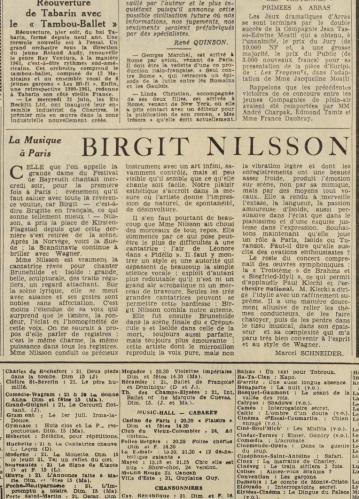
28 juillet 1961 : Siegfried. Festival de Bayreuth. Kempe, Hopf, H. Kraus, Milligan, O. Kraus, Roth-Ehrang, Hoffgen. Birgit Nilsson (Brunnhilde). ENREGISTREMENT LIVE.
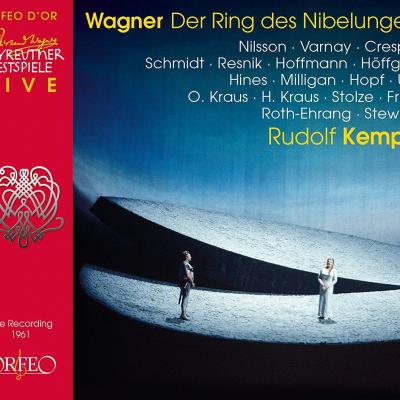
30 juillet 1961 : Die Gotterdammerung. Festival de Bayreuth. Kempe. Hopf. Stewart. Kraus. Frick. Birgit Nilsson (Brunnhilde). Schmidt. Hoffman. ENREGISTREMENT LIVE.
23 août 1961 : Siegfried. Festival de Bayreuth. Kempe, Hopf, H. Kraus, Milligan, O. Kraus, Roth-Ehrang, Hoffgen, Birgit Nilsson (Brunnhilde).
25 août 1961 : Die Gotterdammerung. Festival de Bayreuth. Kempe. Hopf. Stewart. Kraus. Frick. Birgit Nilsson (Brunnhilde). Schmidt. Hoffman.
3 septembre 1961 : Un ballo in maschera. Opéra royal de Stockholm. Folke Nilsson. Ulfung. Hasslo. Birgit Nilsson (Amelia). Lundborg. Tyren. Ericson.
8 septembre 1961 : Aida. Staatsoper de Vienne. Klobucar. Pernerstorfer. Simionato. Birgit Nilsson (Aida). Bergonzi. Frick. Hotter.
10 septembre 1961 : Fidelio. Staatsoper de Vienne. Hollreiser. Windgassen. Birgit Nilsson (Leonore). Guthrie. Schoffler. Kreppel. Seefried. Klein.
12 septembre 1961 : Die Walkure. Londres Walthamstow. ENREGISTREMENT STUDIO. Leinsdorf, Vickers, Ward, London, Birgit Nilsson (Brunnhilde), Brouwenstijn, Gorr. Selon Birgit Nilsson (La Nilsson, pages 356-358), c’est Grace Hoffman qui devait chanter le rôle de Fricka, mais sur la demande de Leinsdorf, celle-ci a été remplacée par Rita Gorr.
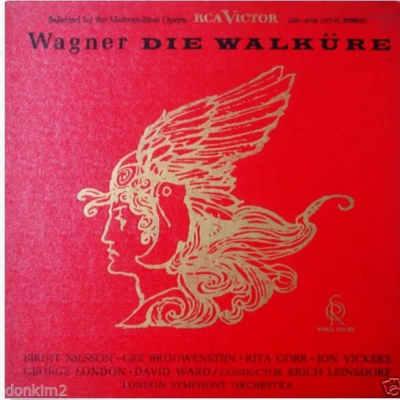
27 septembre 1961 : Turandot. Staatsoper de Vienne. Cleva. Birgit Nilsson (Turandot). Klein. Zaccaria. Nikolov. Gueden.
29 septembre 1961 : Turandot. Staatsoper de Vienne. Cleva. Birgit Nilsson (Turandot). Klein. Zaccaria. Nikolov. Gueden.
16 au 21 octobre 1961 : Salomé. Vienne, studio Sofiensaal. ENREGISTREMENT STUDIO. Solti, Birgit Nilsson (Salomé), Wachter, Stolze, Hoffman, Kmentt.
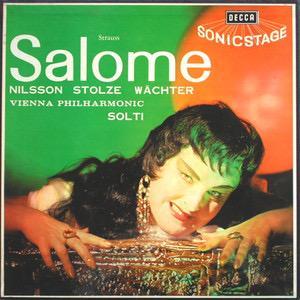
28 octobre 1961 : Tosca. Opéra royal de Stockholm. Bendix. Birgit Nilsson (Floria Tosca). Andersson. Bjorling.
31 octobre 1961 : Un ballo in maschera. Opéra royal de Stockholm. Folke Nilsson. Ulfung. Saeden. Birgit Nilsson (Amelia). Lundborg. Tyren. Meyer.
4 novembre 1961 : Turandot. Metropolitan Opera de New York. Stokowski. Birgit Nilsson (Turandot). Tucker. Amara. Flagello. De Paolis.
Review of Robert Sabin in the December 1961 issue of Musical America
Richard Tucker sang his first Calaf at the Metropolitan at the season's first performance of "Turandot." He has the ringing top voice and stentorian production for the role, but interestingly and gratifyingly enough, his most impressive singing at this performance was in the lyrical passages. The climaxes were a bit dry and pinched in quality, but the voice as a whole had a new richness of color and expressiveness.
Another newcomer to his role was Mr. Flagello, as Timur, and he gave deeply moving performance. Miss Amara's specialty is high, gleaming, faultlessly supported top tones, and therefore she reveled in Liu's exquisite phrases, so wonderfully blended and colored with the orchestral instruments.
Though I did not mention Miss Nilsson first, she was, of course, the overwhelming feature of the evening.
The others were familiar in their roles. Mr. Stokowski seemed tired, and the performance lacked the smashing power and brilliance of last season's performances, although, as always, he elicited lush and beautiful sounds from the orchestra. The stage brass could not apparently see his beat (given without stick) and wavered in several places, though no such catastrophe occurred as did at one performance last season. when they came in fortissimo in the wrong place! Cecil Beaton's decor seemed as lovely as ever.
7 novembre 1961 : Turandot. Metropolitan Opera de New York. Stokowski. Birgit Nilsson (Turandot). Tucker. Amara. Flagello. De Paolis.
13 novembre 1961 : Fidelio. Opéra de Chicago. Maag. Knoll. Seefried. Wilderman. Birgit Nilsson (Leonore). Hotter. Vickers. Berry.
17 novembre 1961 : Fidelio. Opéra de Chicago. Maag. Knoll. Seefried. Wilderman. Birgit Nilsson (Leonore). Hotter. Vickers. Berry.
22 novembre 1961 : Fidelio. Opéra de Chicago. Maag. Knoll. Seefried. Wilderman. Birgit Nilsson (Leonore). Hotter. Vickers. Berry.
1 décembre 1961 : Turandot. Metropolitan Opera de New York. Adler. Birgit Nilsson (Turandot). Tucker. Price. Flagello. De Paolis.
9 décembre 1961 : Die Gotterdammerung. Metropolitan Opera de New York. Leinsdorf. Birgit Nilsson (Brunnhilde). Hopf. Mittelmann. Bjoner. Wiemann. Dalis. Herbert.
Review of Paul Henry Lang in the Herald Tribune
'GÖTTERDÄMMERUNG'
Saturday night's performance of "Götterdämmerung" was a sort of preview of the postlude of The Ring cycle which will begin in chronological order next week. No matter. "Götterdämmerung" can stand by herself without her slim sisters and is apparently quite popular. The performance took from 7;30 to after midnight, the equivalent of three and a half Bruckner symphonies, or a couple of volumes of Gibbon, but with the kind of ending it has no one begrudges the longueurs, least of all Erich Leinsdorf who erased all the cuts from the twenty-five pound score.
But if the immensity of the opera seems forbidding, it none the less deserves a closer contemplation than the book warrants. For the literal-minded long-windedness of the dramatizer of the Nordic saga was also a musician who can give us marvelous mood pictures of sudden decisive power or, by contrast, exhibit a sensibility on the edge of tears against a background of grandeur charged with doom. `The cast contained one extraordinary singer, several very good ones, and some who, while lacking in sufficient vocal power, did fairly well under trying conditions.
Birgit Nilsson's Brünnhilde had many glorious moments - also some intermittent difficulties with just intonation. But what was so affecting about her performance was her womanliness. She was not just a dismounted cavalry girl, but a woman, torn between love, humiliation, pride and resignation. The other ladies, Irene Dalis, Rosalind Elias, Mignon Dunn and Martina Arroyo all had the voices to stand up to Wagnerian demands, but it seemed to me that Ingrid Bjoner, a good lyric soprano, was miscast as Gutrune.
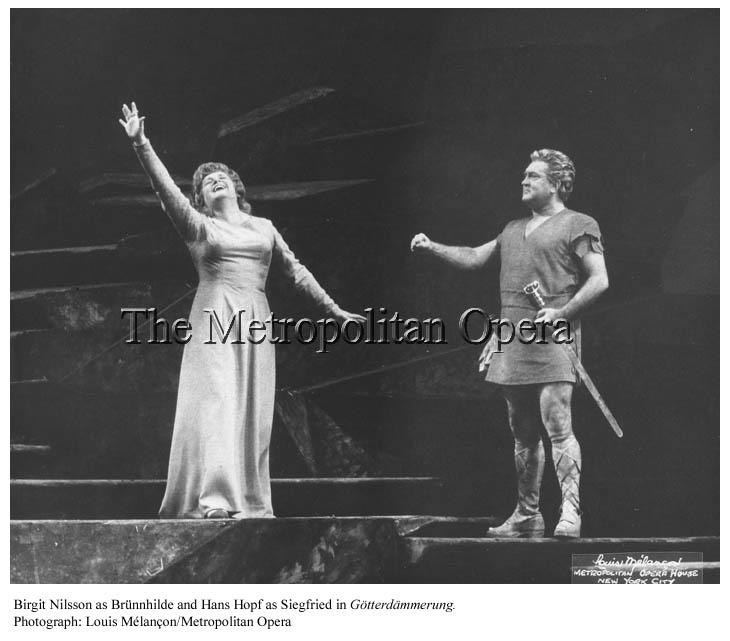
23 décembre 1961 : Die Walkure. Metropolitan Opera de New York. Leinsdorf. Birgit Nilsson (Brunnhilde). Vickers. Kuchta. Edelmann. Dalis. Wiemann. ENREGISTREMENT LIVE.
Review of Robert Sabin in the February 1962 issue of Musical America:
Once again, one rejoiced that Miss Nilsson's glorious voice was given to a splendid musician and skilled actress who could create for us the Brünnhilde of Wagner's imagination. To many of the younger generation her artistry will bring a new understanding of Wagner.
As for Mr. Vicker's Siegmund, it is the best I have ever encountered. He cannot make the walls of the Metropolitan bulge with the "Wälse, Wälse," as Melchior used to, but his singing and acting of the role as a whole have a romantic glow and a musical finish that are well nigh unique.
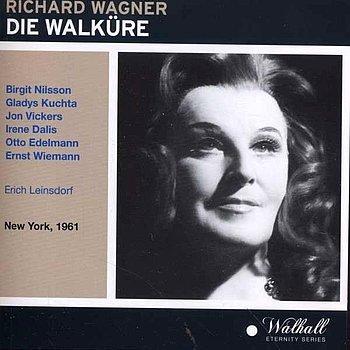
29 décembre 1961 : Die Walkure. Metropolitan Opera de New York. Leinsdorf. Birgit Nilsson (Brunnhilde). Vickers. Kuchta. Symonette. Dalis. Frick.
Mise à jour : 20230710 Pierre Marchais